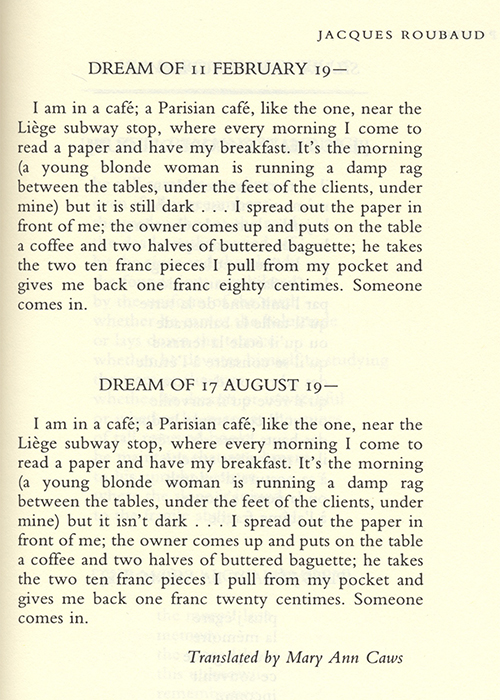Oulipo in Poetry: Mathews, Pastior, and Roubaud

Readers of Harry Mathews’s poem in our June issue, “Cool Gales Shall Fan the Glades,” may be aware that he was the first American to become a member of Oulipo, a group known for creating literature under specific constraints. But what constraint is Mathews working under in this particular poem? He drops some hints in the first stanza, while dismissing the method used in perhaps the most well-known Oulipo work—George Perec’s novel La disparition (A Void)—in which the letter e is never used:
See the pattern? Listeners to our podcast already know the answer. Mathews was kind enough to read the poem for us and he explained that it's a version of a sestina. What makes it different from the usual formula is that when an end word should be repeated, Mathews adds a new letter: y becomes by, at becomes fat, etc. “This particular variation adds to the sense of frustration, of frustrated love mainly,” Mathews observes:
And it has—I don’t want to say what it was but it does have an autobiographical element in it. And here I had this new version of the sestina form to occupy my attention, and so I think I was able to say things that I wouldn’t say otherwise, and perhaps be able to tap into ideas I didn’t know I knew.
You can listen to Mathews read the whole poem by clicking play above (his segment starts at 20:28), or you read the poem yourself here.
This is not the first time Poetry has published an Oulipo member’s work. Two sestinas by the German poet Oskar Pastior, translated by Peter Filkins, were published in our October-November 1998 issue devoted to contemporary German poetry. In the first sestina, “Fliegen Eintag Polyglott,” each stanza is made up of a phrase translated into six different languages. Instead of the end words rotating in each stanza, the languages rotate, with each line including the name of the language in which it is written and the language of the line that follows:
voilà une sixtine française-anglaise:
this is an english-german sestina:
oh eine deutsch-rumänische sestine:
iatǎ şi sextina romîno-ruseascǎ:
äto — russko-italjanskaja sestina:
eccola una sestina italian-italiana:
It's certainly the most enthusiastic, polyglottal sestina I've read:
la sixtine française-anglaise est morte
long live the english-italian sestina!
ma la piu bellissima è la sestina sestina-sestina.
The second poem is “An Interview,” in which an interlocutor asks if, when, and how many times the speaker has been and/or left Rome:
Yes, I've been in Rome, at least two times,
though on second thought it probably was
three or maybe five. When was the last?
That's easy, for I remember it exactly—
at least what it was like when I first left.
You mean a part of you remains in Rome?

We also published several poems by Oulipo poet and mathematician Jacques Roubaud in October-November 2000, a hefty double issue on contemporary French poetry in translation. (Both these translation double issues are well worth checking out—a whole blog post could be devoted to each one!) Mary Ann Caws translated Roubaud’s “Among Many Poems,” “Amsterdam Street,” and these two dream poems, which seem like the right note to end on:



